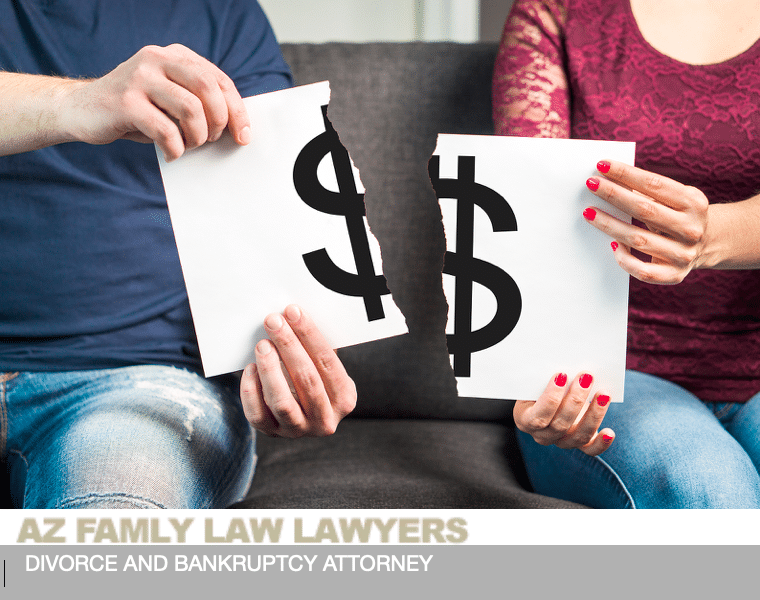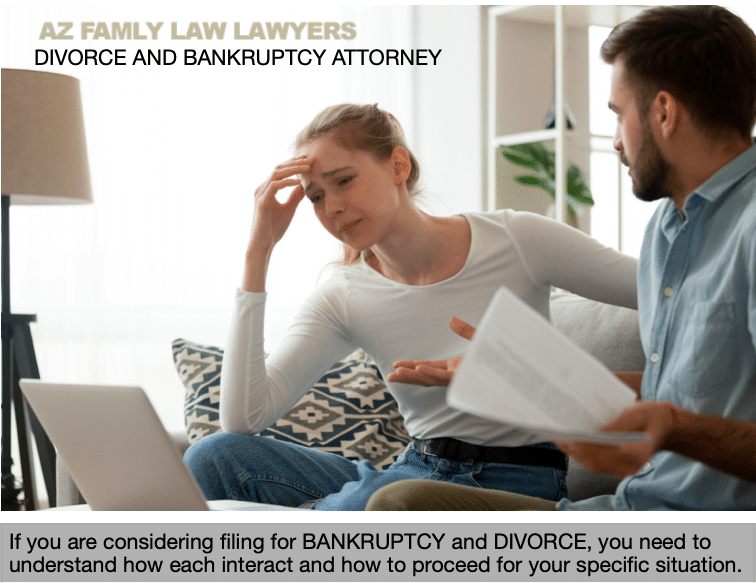Divorce and Bankruptcy
Be Ready For Anything
Avoid These Common Mistakes When Filing Bankruptcy and Getting Divorced
One of the most common reasons that married couples divorce is because of financial issues. These couples can turn to bankruptcy and divorce, legal procedures to dissolve both their debts and their marriage. If you are considering filing for both, you need to understand how bankruptcy and divorce interact under your personal circumstances.

Avoid filing Chapter 13 bankruptcy if you know you want a divorce in the near future. Which should you file first, bankruptcy or divorce? This can depend on a variety of factors, the first of which being the chapter you choose to file. Most personal bankruptcies are filed under either Chapter 7 or Chapter 13 of the Bankruptcy Code. Chapter 7, which is only available to those under certain income levels, liquidates debts without repayment. Chapter 13 reorganizes debts into a payment plan that lasts either 3 or 5 years.
Some filers may qualify for Chapter 7 bankruptcy, but choose to file Chapter 13 bankruptcy anyway. This is because Chapter 13 allows those who are behind on payments like their mortgage and car loan to catch up over those 3-5 years and keep the asset as well. It can also be used for priority debts like child support and spousal maintenance, which can’t be discharged in Chapter 7 and can garnish your wages at a much higher rate than typical debts. The Chapter 13 plan will be based on your income at the time the petition was filed. This can make filing a Chapter 13 while still married tricky. Your payment plan will be based on your combined income, so unless your spouse doesn’t work, affording the payments that are calculated on a dual income will be nearly impossible. Chapter 13 plans will leave you with very little disposable income at the end of each month- definitely not enough for one spouse to go out and rent a new home. Divorcing will become exponentially more difficult for the 3-5 years the payment plan lasts.
Filing Chapter 7 Before a Divorce
Avoid paying costs for two separate bankruptcies if you can wait a few months to file divorce. While filing a Chapter 13 bankruptcy before a divorce usually isn’t a good idea. However, Chapter 7 BK is a much faster process, and filing it before divorce can have many advantages. One of these is that it reduces the amount of time you will need to spend on property division in the divorce. Arizona is a community property state, so both assets and debts that were acquired while the couple was married will be split evenly if they divorce. One spouse may agree to pay more than their fair share of the community debts in exchange for keeping valuable shared assets like the marital home, pets, furniture, and vehicles acquired during the marriage. However, if the spouse who agreed to paid debts later discharges them through Chapter 7 bankruptcy, the creditors may still pursue the other spouse for payment. If the couple files Chapter 7 while they are still married, the debts will be discharged as to both of their names. This also saves time (and hourly attorney’s fees) on asset division during a divorce.


Chapter 7 is a much faster process than Chapter 13. A typical Chapter 7 bankruptcy only lasts 3-6 months, compared to the 3-5 years a Chapter 13 takes. This makes it more feasible for couples who know they want to get divorced to proceed with a bankruptcy first. This will save the couple bankruptcy costs compared to filing bankruptcy separately after the divorce. The filing fee for a Chapter 7 is $335 whether it is a single or joint filing. Attorneys typically do not charge much more for representation of a married couple than a single filer. Anyone who files bankruptcy is also required to take two online bankruptcy courses, which a married couple can take together but single filers will have to take, and pay for, separately.
Filing Chapter 7 After a Divorce in Arizona
Avoid filing for Chapter 13 bankruptcy if you would qualify for Chapter 7 after you divorce your spouse. While filing bankruptcy while still married can save a married couple time and money, it is still sometimes better to wait until a divorce is finalized to proceed with a Chapter 7 bankruptcy. There are strict income limits for Chapter 7 filers that may be easier to meet when the spouses are no longer married.
There are only two ways to qualify for a Chapter 7 bankruptcy in Arizona. One of these is the Means Test. This will combine the couple’s average monthly incomes and deduct necessary expenses. If the number left is negative, the couple will qualify. However, most filers looking to qualify for Chapter 7 simply compare their income to the median income level for their state. If their income is less than the state median, they automatically qualify for Chapter 7.
In Arizona, the median income for a married couple is $65,713. This number increases to $71,704 if the couple has a minor child, $86,950 if they have two, and so on. This makes it difficult for spouses who are both employed, especially those that don’t have minor children, to qualify. If they divorce first, their bankruptcies- and income- can be separate. The spouses should consult a bankruptcy attorney to determine if filing bankruptcy after divorce will allow them to qualify for Chapter 7, and who would be able to claim the child as a dependent for the purposes of income qualification.


Only One of Us Wants to File. Now What?
If only one of you wants to file bankruptcy, you can still proceed with a Chapter 7 without including your spouse. However, debts will only be discharged as to your name. Your spouse will be protected while you are still married but your creditors will pursue your spouse for the discharged debts if you divorce. Your spouse’s income will still be included with your own for qualification purposes. Filing Chapter 13 without your spouse’s cooperation simply isn’t feasible.
Divorce can be filed unilaterally, meaning if one spouse wants to divorce, it can proceed even if the other spouse doesn’t want to divorce. The spouse who files for divorce, the petitioner, will list their preferred terms of the divorce in the petition. If the other spouse, the respondent, refuses to answer the petition, the petitioner will be granted a default order.
Do I Need an Attorney?
Avoid proceeding with a bankruptcy or divorce unrepresented. You should always at least consult with an attorney before proceeding with a legal matter, even if you end up choosing to represent yourself. Many attorneys offer consultations at no cost to you. You should also consider consulting with a full service law firm, meaning it handles many types of cases, including bankruptcy and family law. These attorneys are best equipped to help you strategize the timing of your divorce and bankruptcy. They will also help you confirm which chapter(s) of bankruptcy you qualify for.
Uncontested, amicable divorces can often be resolved without hiring attorneys. If the couple has been married for a significant period, has minor children together, or acquired significant debts and assets during the marriage, this complicates the divorce and often requires legal representation. Bankruptcy filers who proceed pro se, or without an attorney, stand a decent chance in Chapter 7. Approximately ⅔ of those cases are successfully discharged. Pro se Chapter 13 filers have a success rate of less than 1 percent.
If you need help with bankruptcy, divorce, or both, our office is here for assistance. We offer free phone consultations in both types of cases, as well as reasonable attorney’s fees and payment plan options. The best legal representation doesn’t have to break the bank- learn for yourself by scheduling your free consultation today.
Divorce and Bankruptcy FAQs in Arizona
What is Divorce in Arizona?
What is Bankruptcy?
Can I File Both Divorce and Bankruptcy?
If you File Bankruptcy DURING the Divorce, what happens?
Which Should I File First, Divorce or Bankruptcy?
Filing bankruptcy before divorce has its advantages if you qualify for Chapter 7. You and your spouse will be free from any community debts you have and not spend time and attorney’s fees resolving that during your divorce. You will also save money on filing and attorney’s fees because you can share your attorney instead of each hiring your own. However, you may have an easier time qualifying for Chapter 7 after a divorce.
What if my Spouse Wants to File Bankruptcy on their own?
What Kind of Debts Are Split in a Divorce?
Can I Get my Divorce Expenses Discharged in a Bankruptcy?
What if my Ex-Spouse Files Bankruptcy AFTER our Divorce?
Do I Need a Separate Attorney to File Bankruptcy than I Used for my Divorce?
Contact The Family Law Attorney


